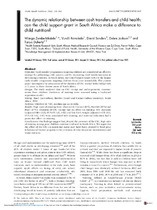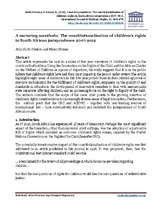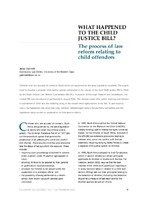| dc.contributor.author | Zembe-Mkabile, Wanga | |
| dc.contributor.author | Ramokolo, Vundli | |
| dc.contributor.author | Sanders, David | |
| dc.date.accessioned | 2021-09-15T16:34:22Z | |
| dc.date.available | 2021-09-15T16:34:22Z | |
| dc.date.issued | 2016 | |
| dc.identifier.citation | Zembe-Mkabile, W. et al. (2016). The dynamic relationship between cash transfers and child health: Can the child support grant in South Africa make a difference to child nutrition?. Public Health Nutrition,19(2), 356–362 | en_US |
| dc.identifier.issn | 1475-2727 | |
| dc.identifier.uri | https://doi.org/10.1017/S1368980015001147 | |
| dc.identifier.uri | http://hdl.handle.net/10566/6692 | |
| dc.description.abstract | : Cash transfer programmes targeting children are considered an effective
strategy for addressing child poverty and for improving child health outcomes in
developing countries. In South Africa, the Child Support Grant (CSG) is the largest
cash transfer programme targeting children from poor households. The present
paper investigates the association of the duration of CSG receipt with child growth
at 2 years in three diverse areas of South Africa.The study analysed data on CSG receipt and anthropometric measurements from children. Predictors of stunting were assessed using a backward
regression model. | en_US |
| dc.language.iso | en | en_US |
| dc.publisher | Cambridge University Press | en_US |
| dc.subject | Cash transfers | en_US |
| dc.subject | Child growth | en_US |
| dc.subject | Nutrition | en_US |
| dc.subject | Child health | en_US |
| dc.subject | Child poverty | en_US |
| dc.title | The dynamic relationship between cash transfers and child health: Can the child support grant in South Africa make a difference to child nutrition? | en_US |
| dc.type | Article | en_US |



